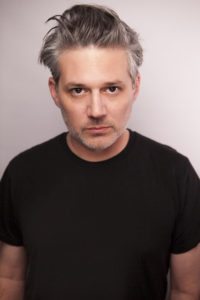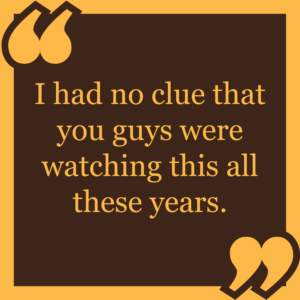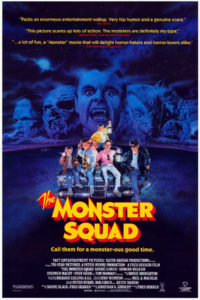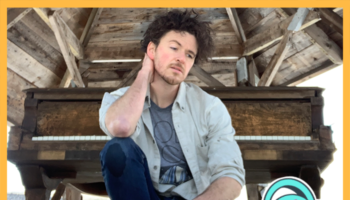 It’s that time again. Let’s sit back, relax, and take a trip down memory lane with those individuals who inadvertently played a role in our childhood. This time out we’re chatting with Ryan Lambert, who as a teenager, starred in the film “The Monster Squad.” Anyone who was growing up in the 80s and was lucky enough to have had paid cable fell in love with the movie, which pitted a group of small town kids against an army of classic monsters, including Dracula. Lambert played Rudy, the resident badass who every young impressionable viewer wanted to be. Shorty after the film was released, Lambert left acting to pursue his music career. He has since rediscovered his passion for acting and returned to the city that gave him his break via the television series “Kids Incorporated” some 30 years ago.
It’s that time again. Let’s sit back, relax, and take a trip down memory lane with those individuals who inadvertently played a role in our childhood. This time out we’re chatting with Ryan Lambert, who as a teenager, starred in the film “The Monster Squad.” Anyone who was growing up in the 80s and was lucky enough to have had paid cable fell in love with the movie, which pitted a group of small town kids against an army of classic monsters, including Dracula. Lambert played Rudy, the resident badass who every young impressionable viewer wanted to be. Shorty after the film was released, Lambert left acting to pursue his music career. He has since rediscovered his passion for acting and returned to the city that gave him his break via the television series “Kids Incorporated” some 30 years ago.
TrunkSpace: After leaving the business to focus on music, you recently returned to Los Angeles to pursue acting again. The industry has changed so much since you stepped away. There are now so many channels and outlets in need of content, so as you return to the business, have you noticed that there are more jobs now than when you were working during the 1980s?
Lambert: It’s weird. It’s kind of a catch-22. You’re absolutely right, there are a billion shows out there to audition for and there’s more content, obviously, but the problem is, using my “Kids Incorporated”/“Monster Squad” has become moot, basically. It was too long ago and I’m a different person now. I can’t use those credits as much as I thought I was going to be able to. There is a little bit of a window because I have experience and I understand what it is to be on set and what that means and that aspect hasn’t changed as much. You’re still on a set. There’s still a second AD. There’s still the gaffers and the grips… they’re all still there. To know where to stand and be professional, that hasn’t changed. So, in that regard I kind of have the one-up on the guy who gets off the bus from Kansas.
TrunkSpace: “The Monster Squad” is a shining example as to why classic makeup and prosthetic-based SFX work. That creature (the Gillman) still looks badass to this day.
Lambert: Yeah. Those suits were amazing. That was Stan Winston and his crew. I was just talking to Tom Woodruff who was in that suit. Everyone loved The Creature suit. It was perfect. It was exactly what it was supposed to be. It did what it was supposed to do and the person inside did what they were supposed to do and then you film it. That’s the way it should be. That’s the way movies are made. I’m not opposed to CGI at all. I just think it’s been overused and I don’t think you need an entire film that’s created out of that.
TrunkSpace: When done right, the classic makeup and prosthetic-based SFX become part of the actor. Sometimes CGI can look great on the big screen, and then you watch it again on your television and it doesn’t carry over as well.
Lambert: Sure. In that day and age, we’re talking like 1986, you work with what you have. There was no CGI. (Laughter) So, there was no choice, so who are you going to go to make sure that this looks as great as it can possibly be? Well, you’re going to go to Stan Winston. You’re going to go to him or Carlo Rambaldi or something and they’re going to do you right and that’s exactly what Fred (Dekker) and company did. They went and got the best and the best came out.
TrunkSpace: The movie was released at the dawn of cable and as such, there wasn’t a constant flow of content available then like there is today. Do you think that helped put “The Monster Squad” in front of so many people from our generation… the fact that channels like HBO played it in such heavy rotation?
Lambert: I think that’s where it lived. That’s where it found the audience. It didn’t find the audience in the theaters. We can blame a lot of things about what happened to it in the box office. I like to blame the marketing team. I don’t think they marketed it correctly. I don’t think there was enough emphasis on what the actual film was trying to represent or what it was about, at least in this country. And then, it slowly but surely found it’s way into people’s lives… unaware to any of us. Once it was released and it kind of tanked, we were done with it. Like, I forgot about it. We all loved it and were proud of it, but the truth of the matter was, it just didn’t happen.
TrunkSpace: So does that make it especially odd to still be talking about it 30 years later?
Lambert: It doesn’t feel that way now because about, almost 10 years ago now, we found out that they were doing a big screening of it in Austin, TX and they invited us to come watch it and do a  Q&A before and after the screening. And we were like, “What?” I hadn’t even seen any of these people in years. I mean, I was off doing my own thing. I was in bands in San Francisco and I didn’t know of any of it… I didn’t know it had a cult following. I had absolutely no clue. And we show up and there’s a line around the corner and everyone’s freaking out. (Laughter) Everyone’s got posters and T-shirts and everyone wants us to sign everything. I was like, “Where did you people come from? What has been going on this whole time!” I had no clue that you guys were watching this all these years. So, since then, almost consistently, it’s been nonstop with conventions and screenings and interviews and things here and there. So I’m used to it now. I get it now. I see it now.
Q&A before and after the screening. And we were like, “What?” I hadn’t even seen any of these people in years. I mean, I was off doing my own thing. I was in bands in San Francisco and I didn’t know of any of it… I didn’t know it had a cult following. I had absolutely no clue. And we show up and there’s a line around the corner and everyone’s freaking out. (Laughter) Everyone’s got posters and T-shirts and everyone wants us to sign everything. I was like, “Where did you people come from? What has been going on this whole time!” I had no clue that you guys were watching this all these years. So, since then, almost consistently, it’s been nonstop with conventions and screenings and interviews and things here and there. So I’m used to it now. I get it now. I see it now.
TrunkSpace: So in terms of your personal life, at the time of the theatrical release, it sounds like it didn’t really change anything for you?
Lambert: Pretty much zero. I filmed it, I made good friends, and it came out and it bombed and I moved on and did some other projects after that. And then I decided that I didn’t want to do it anymore because my original plan was, when I was about 8, was that I was going to be a musician and I was going to be in bands and be a singer… hence “Kids Incorporated.” I went out on an audition someone had told me about and it was like a musical. “Go be in a rock band on television!” And I was like, “Okay.” And so I went on an audition and I got it and that was my life. I was like a little kid singing horribly on television and that’s what my path was, but the trick to being on a television show is that you need an agent. So I was already on the show and they were like, “Now you have to go get an agent to represent you.” So I went and got an agent and that agent started sending me out on acting roles. So I was like, “Oh, I’m an actor now.” Well that wasn’t what I originally set out to do, so after awhile, everyone kept telling me that I could do both. And at that time in the 80s, I didn’t feel like that was something you could do. I thought that if I was an actor, no one was going to take me seriously as a musician. I thought that you could do it the other way around… like if you were David Bowie and then wanted to be in a movie, you know? But I didn’t think that if you were an actor, you know, like if Jack Wagner on “General Hospital” wanted to make a record, it wasn’t going to be taken seriously. So I thought the only way to make this real is to stop acting, which is what I did. Everyone was really pissed off. My agent. My manager. My parents. Because I was on the verge of something. I was getting in to see great people and I was about to do bigger films. I was getting them and I turned everything down and I decided that that’s not what I wanted to do, so I went and became a rock star. (Laughter)
TrunkSpace: So why do you think the acting bug came back and bit you?
Lambert: Well, to tell you the truth, I started to get a little discouraged with the music industry and where everything was going and I was a little bit discouraged about the music that I was making. I had been in a bunch of bands, four to be exact, and my last one was… we were having fun but it kind of wasn’t becoming a business. It was just like, “Let’s go down and have fun” but like, “Yeah, but what am I doing with my life?” So, in San Francisco I decided to join a theater company, Shelton Studios, and just see how I felt about something that I was successful in at a period in  my life and see if I was even any good at it still. And it turns out, I felt like I was. I was like, “Hmm… this feels good.” I felt great on stage and I felt good with words and I felt good with my body language and I had teachers that backed me up. And I didn’t even tell them about what I did earlier. They had no idea who I was. So, eventually I told them and they were like, “Oh, well that’s it. You’ve done this before. You are seasoned.”
my life and see if I was even any good at it still. And it turns out, I felt like I was. I was like, “Hmm… this feels good.” I felt great on stage and I felt good with words and I felt good with my body language and I had teachers that backed me up. And I didn’t even tell them about what I did earlier. They had no idea who I was. So, eventually I told them and they were like, “Oh, well that’s it. You’ve done this before. You are seasoned.”
TrunkSpace: Which must have been nice for you in terms of getting the current work recognized as opposed to the past work?
Lambert: I feel a lot of people would do that. Like, “I’m so and so and you’ve got to listen to me because I’ve done this and you haven’t done shit.” I didn’t want to approach it that way. I wanted to go in there like a layman. Teach me! Which is what I really actually wanted. I didn’t want to feel superior to anybody, because I wasn’t. I was nobody. I’m nobody. Even when I came back here (LA) and started talking to agents, they’re like, “I can’t resurrect your career.” I said, “I don’t want you to!” I want to be Cop #3 on Law & Order. The thing is, if you talk to any actor, even the biggest actors in the world, all they want to do is work.
TrunkSpace: So do you think your past acting resume actually hurts your future acting resume?
Lambert: I do. I mean, again, the catch-22 thing… look at what I have done. I have the credits to back me up and the footage, but at the same time everyone’s like, “Yeah, but that’s you as a little kid… give me what you’ve got now.” And besides the few short films that I’ve done here and there in this day and age, it’s hard to get in the door. Everyone’s like, “Oh my god… ‘The Monster Squad.’ I love that movie. But, what are you doing now? What can you give me now?” Well, let me show you.






